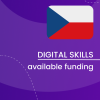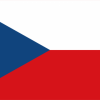Czech Republic: a snapshot of digital skills

Introduction
In the 2024 edition of the Digital Decade report, the Czech Republic has achieved 69.1% basic digital skills coverage, compared to the EU average of 55.6%. This puts the Czech Republic at 86.4% of the overall target for the EU 2030 goal, which aims to have 80% of the EU population possessing at least basic digital skills. The country has seen an annual growth of 7.6% from the previous year.
According to the Digital Decade report 2024, the Czech Republic performs worse than the EU average in the percentage of ICT specialists in employment. The country is under the EU average, decreasing from 4.5% to 4.3% (EU average - 4.8%).
DigiKoalice, the full name of the Czech National Coalition for Digital Skills and Jobs, which was established in the Czech Republic on November 28, 2016, following the example of initiatives from abroad. DigiKoalica brings together more than 200 member organizations from among representatives of state institutions, ICT companies, schools and non-profit organizations.
Overview of state strategies and national initiatives
State strategies
Digitalisation has been placed high on the agenda since 2018, and at the beginning of 2019, an umbrella document Innovation Strategy of the Czech Republic was introduced. With an emphasis on knowledge-based production, technological solutions, and services, the Innovation Strategy of the Czech Republic (2019 – 2030) aspires to make science, research, and innovation the nation's top priorities. The strategy covers the development of digital competencies and skills in education, for the labour force, and for information and communication technology (ICT) professionals, along with other pillars. Alongside the Innovation Strategy, in May 2019, the Czech Republic adopted the National Artificial Intelligence Strategy (NAIS).
Furthermore, in 2020 The Education Policy Strategy for 2030 was accepted. The strategic document's objectives are to modernise the educational system in Czech Republic in the areas of regional education, formal and informal education, and lifelong learning as well as to prepare for emerging issues while resolving those that have already been identified within the existing educational system. Upskilling and reskilling efforts are initiated along 5 strategic lines of the Education Policy Strategy for 2030.
National initiatives
The Czech Republic’s Recovery and Resilience Plan has a total allocation of EUR 7 billion in grants, and 22% will foster the digital transition. The RRP focuses on responding on the urgent need to support a robust recovery and preparation for the future. The plan's reforms and investments will make Czech Republic more resilient, sustainable, and well-equipped for the opportunities and challenges presented by the green and digital transitions. The plan consists of 91 investment measures and 33 reforms.
The DigiKoalice website offers events calendar with an opportunity to search for digital skills events; A range of courses to develop your digital skills, both Czech courses, but also European and international courses; a collection of best practices in the development of IT skills for children and adults with an opportunity to filter by the region; different initiatives in the field of Digital Skills and Jobs; and a blog that allows every member of DigiKoalice to participate in discussions regarding the organization's activities in the field of digital education and support for digital jobs.
The non-profit organisation Czechitas is the driving force behind the programme Czechitas - New Generation, which aims to advance diversity in the information technology (IT) industry by boosting the participation and numbers of women and girls as well as the digital skills of the next generation of young people. Launched in 2014, the organisation has established educational and community centres in eight cities. The regional offices concentrate on the needs and requirements of the local community in order to engage younger generation across the Czech Republic. Additionally, Czechitas provides scholarships for female students enrolled in the Digital Academy, which is supported by the European Social Fund. Czechitas was also a finalist on the 2024 edition of the European Digital Skills Awards.
Funding opportunities
Funding opportunities for upskilling and reskilling to support the digital competences of individuals and organizations are available in the form of loans, grants, and financial instruments. For the period 2021 – 2026, most of the activities in digital transformation are financed through Recovery and Resilience facility but also as activities in Horizon, Erasmus+, ESIF and EEA grant schemes. You may find more on the page of the Czech Republic’s National Digital Skills and Jobs Coalition and in the article on the Digital Skills and Jobs Platform.





